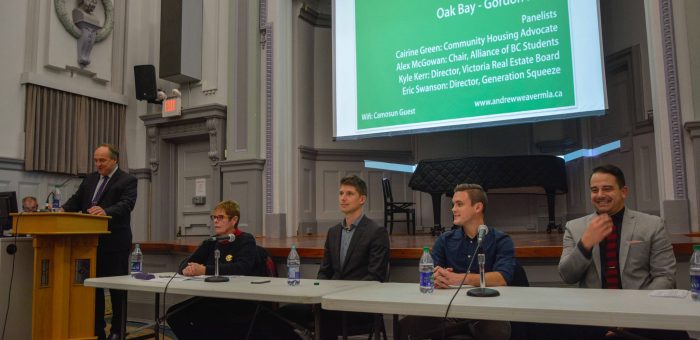Housing
Constituency Report – October 2016
Constituency Report is a public service that Shaw TV graciously offers MLAs. This month’s video is provided below.
Judy Fainstein and I once more tried something different. The first segment follows the usual discussion of legislative issues relevant to Oak Bay-Gordon Head and British Columbia in general. In the second segment, I introduce Maxwell Nicholson, Director of Campaigns & Community Relations with the University of Victoria Student’s Society. We explore a number of issues facing students in Greater Victoria.
As always, I’d be interested in your feedback on this constituency report.
Constituency Report
Highlights from Housing & Affordability Town Hall
I would like to extend my sincere thanks to everyone who attended and participated in our recent Town Hall on Housing and Affordability. We were lucky to have a diverse range of panelists bring their own perspectives and insights to our discussion about the complex challenges facing our housing market. In the Q&A period following the presentations, audience members provided their personal perspectives on how the housing and affordability crisis has affected them, asked a number of insightful questions and offered some creative potential solutions. It was a lively and informative discussion.
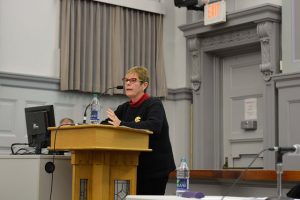
Cairine Green, a Community Housing Advocate and volunteer Board Director for Our Place Society, spoke about some of the causes and the effects of the housing and affordability crisis in Victoria and across the Province. The BC Non-Profit Housing Association defines affordable housing as requiring 30% or less of gross household income (in 2012); two other factors are suitable housing, where there are enough bedrooms for the size and make-up of occupants, and adequacy, where a home does not require major repairs. Increasingly, fewer and fewer people in Victoria live in housing that meets these criteria. Cairine highlighted the importance of affordable housing in maintaining healthy and sustainable communities, and the concerns of low-income seniors who want to be able to stay in their homes as they get older. She outlined the actions that municipalities can take to stem the tide of rising housing costs, and the need for different levels of government to work together to implement solutions.
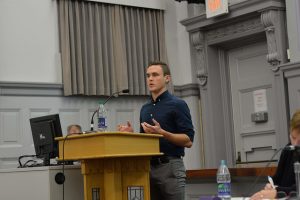 Alex McGowan, Chairperson of the Alliance of BC Students and President at the Kwantlen Student Association, emphasized the challenges facing students looking for housing, as well as the steps that Universities can take to address student housing needs, thereby benefitting the rental market more widely. His comments were supported by Maxwell Nicholson, Director of Campaigns & Community Relations from the UVic Student Society who was also in attendance.
Alex McGowan, Chairperson of the Alliance of BC Students and President at the Kwantlen Student Association, emphasized the challenges facing students looking for housing, as well as the steps that Universities can take to address student housing needs, thereby benefitting the rental market more widely. His comments were supported by Maxwell Nicholson, Director of Campaigns & Community Relations from the UVic Student Society who was also in attendance.
In the last ten years, the number of full-time students in B.C. has steadily grown and the number of international students has nearly doubled, yet very few new residence spaces have opened. There is a high demand for student housing: the Alliance of BC Students estimates that Universities in BC need to double their stock of student housing to meet the need. In 2014/2015 there were 10,900 students on waitlists for campus housing in B.C., nearly 3,000 of which were on the UVic list alone. Student housing is cheap to build, and would play an important role in easing the pressure on the rental market, creating space for those who may be currently in unaffordable housing or squeezed out of the market all together. A serious problem is that the Province won’t allow post-secondary institutions to take on the debt needed to build more student housing on their land. Yet debt undertaken to build campus housing in B.C.’s desperate market would not impact the government’s credit rating as it would be self-supporting through residence fees.
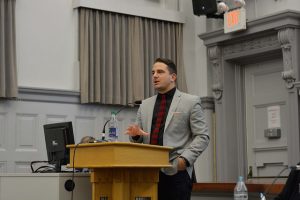 Kyle Kerr, a licensed Realtor with RE/MAX Camosun, Associate Partner with Tony Joe and Associates, and a Director of the Victoria Real Estate Board, brought his insights from his experience in real estate to bear on the crisis in Victoria. He highlighted the factors that make Victoria such an attractive place to live and have led to an increase in net migration here, such as the industries here (including Government, military, tourism and technology), our educational institutions, and the lifestyle that Victoria offers. These strengths make it unlikely that we will see a significant housing crash or a “bursting of the bubble” in Victoria. Kyle also discussed the need to build more affordable housing, and to increase density, to meet demand.
Kyle Kerr, a licensed Realtor with RE/MAX Camosun, Associate Partner with Tony Joe and Associates, and a Director of the Victoria Real Estate Board, brought his insights from his experience in real estate to bear on the crisis in Victoria. He highlighted the factors that make Victoria such an attractive place to live and have led to an increase in net migration here, such as the industries here (including Government, military, tourism and technology), our educational institutions, and the lifestyle that Victoria offers. These strengths make it unlikely that we will see a significant housing crash or a “bursting of the bubble” in Victoria. Kyle also discussed the need to build more affordable housing, and to increase density, to meet demand.
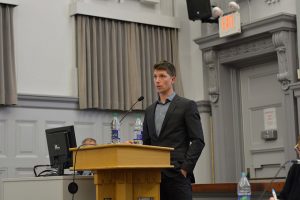 Eric Swanson, Executive Director of Generation Squeeze, showed how the odds that young Canadians face in getting into the housing market and purchasing their own home are difficult, if not impossible, to overcome. He highlighted the differences in the magnitude of the challenges faced by young Canadians today versus forty years ago, in 1976, showing that average earnings have decreased, student debt has increased, and the average housing price has more than doubled, leading to a situation where young Canadians in BC have to save more than three times as long for a down payment on a house today than in 1976.
Eric Swanson, Executive Director of Generation Squeeze, showed how the odds that young Canadians face in getting into the housing market and purchasing their own home are difficult, if not impossible, to overcome. He highlighted the differences in the magnitude of the challenges faced by young Canadians today versus forty years ago, in 1976, showing that average earnings have decreased, student debt has increased, and the average housing price has more than doubled, leading to a situation where young Canadians in BC have to save more than three times as long for a down payment on a house today than in 1976.
Potential solutions to the crisis highlighted by the panelists and explored in the Q&A period include actions that different levels of government and members of the public can take.
The Provincial Government can offer support for co-housing or blended housing, to allow seniors to stay in their homes, while providing an affordable rental option for low-income individuals, families or students. As an essential step in addressing student housing needs, the Province could reverse its stance on preventing universities from acquiring debt to build more on-campus housing.
Municipalities have a number of tools at their disposal that they can use to address the housing crisis. These include:
- Removing minimum unit size requirements;
- Reduce parking requirements for units;
- Removing re-zoning requirements for garden and laneway housing;
- Reviewing housing reserve fund guidelines for grants to developers of affordable housing projects;
- Supporting the conversions of older hotels/motels to housing units;
- Establishing land trusts, in which municipalities contribute publicly-owned land at no cost or at a reduced market value for the development of affordable housing projects;
- Demanding more from developers, such as higher percentages of affordable units to meet community need;
- reducing unnecessary regulations in building codes.
The City of Victoria has already implemented some of these measures, and is considering more, such as “an inclusionary housing density bonus policy” where new housing has to represent the income distribution of the area in which it is built.
Individuals can become familiar with their official community plans and local housing strategy. An important action that individuals can take is to attend council meetings to express their thoughts on proposed projects, especially voicing their support for projects that would result in more affordable housing.
I am grateful for the commitment and ongoing concern so many in our community are giving to this crucial issue facing our Province. There are few topics of more importance facing our Province today.
MLA Town Hall on Housing and Affordability
On Tuesday, Oct. 18, I’ll be hosting a town hall on housing and affordability with four expert panelists. Each speaker comes from a different housing-related background, so they’ll bring a diverse range of perspectives and considerations to our discussion about the complex, multifaceted challenges facing our housing market.
Over the course of the evening we’ll discuss policy and market conditions that have led to our current situation, analyze the immediate challenges we face and look at where we can go from here. We’ll explore what can be done now to increase housing and rental stock and how we can prepare for the future. And, the fundamental question that underpins everything, what do we want our communities to look like in coming years?
Everyone is more than qualified to speak to the concept of a community vision, and I want to give you the opportunity to do so. Reserving plenty of time for audience questions, comments, and discussion is a priority for the event.
In addition to a community housing advocate and three-term municipal councilor, the Director of the Victoria Real Estate Board and the executive director of Generation Squeeze, one of our panelists will be Alex McGowan, chair of the Alliance of B.C. Students. McGowan and his colleagues recently released a report on the influence student housing demands have on a housing market in crisis. They urge the B.C. government to amend existing restrictions on public entity debt that prevents post-secondary institutions from building more on-campus residences.
“We know that as students, we often occupy the low end of the rental spectrum; what we might not realize is who we may be squeezing out of the market altogether,” McGowan said. “Getting students on campus and out of the rental market helps everyone, including the single parent struggling to find housing, the minimum-wage worker who can’t find a rental they can afford, and those who are currently in housing, but spending more than 50 per cent of their income on rent. Our proposal could go a long way to helping B.C.’s rental market come back to a normal level, and at very little cost to the government. It’s time to help students, improve the quality of education and help alleviate the housing crisis that is hurting everyone.”
Preventing post-secondary institutions from taking on the debt to build more housing on their land is defended by the need to protect B.C.’s high credit rating. While that is indeed important, debt undertaken to build campus housing in B.C.’s desperate market would not impact the government’s credit rating as it would be entirely self-supporting through residence fees.
In the last 10 years, the number of full-time students in B.C. has steadily grown and the number of international students has nearly doubled, yet very few new residence spaces have opened.
In 2014/2015 there were 10,900 students on waitlists for campus housing in B.C., nearly 3,000 of which were on the UVic list alone. UVic has 2,481 residence spaces and in 2014 had 16,649 full-time students. With a rental vacancy rate around 0.6 in Victoria, there is clearly an unsustainable discrepancy between the demand for affordable housing and the supply.
As McGowan and the Alliance of B.C. Students have noted, building more student housing is not just about students. It is about alleviating some of the pressure on an overstretched rental market in a timely and responsible manner.
I hope you’ll join us on Tuesday, Oct. 18 from 7 to 9 p.m. in the Gibson Auditorium at Camosun College (Landsdowne Campus Young Building 216) to discuss this, and other solutions, in greater detail.
Town Hall: Housing and Affordability
MLA Town Hall – Housing and Affordability
October 18th – 7pm to 9pm (doors open at 6:30pm) Camosun College – Landsdowne Campus
Young Building 216 – Gibson Auditorium
Join Andrew Weaver, MLA for Oak Bay Gordon Head and Leader of the B.C. Green Party, for an informative Town Hall on housing and affordability in Greater Victoria and throughout the province. Victoria has one of the lowest rental vacancy rates, coupled with rising home prices, which is making the region un-affordable for many, especially students and young professionals, and affecting economic development as new or expanding businesses find it difficult to attract employees.
Our panel of experts will discuss what can be done now to increase housing, and how we can prepare for the future. The discussion and presentations will be followed by an audience question and answer period.
Panel:
Cairine Green – Community Housing Advocate
Alex McGowan – Chair, Alliance of BC Students
Kyle Kerr – Director, Victoria Real Estate Board
Eric Swanson – Executive Director, Generation Squeeze
Everyone is welcome
Designated long-term rental units desperately needed
Skyrocketing real estate markets across the Lower Mainland and Southern Vancouver Island are dragging the rental market with them.
Frances Bula recently wrote in The Globe and Mail, “as people are shut out of the housing market, more people have no choice but to remain as renters who are competing for a limited supply of housing in a system that has treated renters like second-class citizens for decades.”
She’s right, and for people who are young, non-white, have mental health issues, unemployed, recent immigrants, poor, disabled, or have pets, finding a safe, affordable home can seem nearly impossible in markets with vacancy rates around 0.6 per cent like Victoria.
With constrained real estate mobility, people have little choice but to stay in suites that would have previously been viewed as shorter-term student rentals and I am getting increasingly concerned about where the young people in my riding are going to live this upcoming school year. A representative from Camosun College told us he too is very worried about the situation and described it as a complete crisis with some students living in cars and others forced into overcrowded, expensive shared suites.
We so desperately need more designated long-term rental units in B.C. Spaces that people can make their home, places that welcome children and pets and have some outdoor space. Homes for people who will rent for large portions of their life, either by necessity or choice.
Co-operative housing arrangements are another promising avenue to bridge the gap between the rental and homeownership markets. They provide shareholders with a long-term, sustainable home and create diverse communities, supporting multi-generational residents of varying income levels.
Unfortunately, few co-operative housing developments have been built in B.C. since the 1990s when the federal government released its social housing responsibility to the province and existing units have multi-year waitlists. Given our current housing crisis, and the province’s new Housing Priority Initiatives Fund, I think the B.C. Liberals, in conjunction with municipalities and the federal government, need to step in to help housing co-operatives with land acquisition and planning costs.
Each level of government has various tools available to them that they can use to tackle the housing crisis from different angles. To guide these initiatives we need, and have needed for years, more comprehensive data about the trends impacting our housing market. The information about buyer nationality that the province began collecting this June is a start, but making major policy decisions based on five weeks of data – as the B.C. Liberals did with Bill 28 – is far from ideal.
Knowing that we are going to be faced with challenging housing decisions for years to come, we need to start collecting more data now so we can design informed policy for the future. Determining who is purchasing homes, and how many, in B.C. would allow the government to identify the flow of foreign investments, the role corporations are playing, and whether we are seeing speculation in our market coming from other regions in Canada.
Tracking house flipping (when investors buy a house to quickly resell it at higher price) is an important aspect of understanding an over-inflated market. Imposing a sales tax on homes sold within one or two years of purchase could be an effective way of curbing house flipping but, again, it is a policy that should be founded in comprehensive data.
Studying the impact of Airbnbs, I suspect, would shed a lot of light on changes happening in the rental market. Airbnb has already said it’s open to some restrictions tailored to tight rental markets, including banning hosts from using the popular online platform to run a business renting out multiple units, but governments (municipal and provincial) will need solid data to move forward with such policies.
Long-term and ongoing data collection is vital to the future of homes in B.C. – the sooner we start the better.
Feature photo by Josefontheroad.


